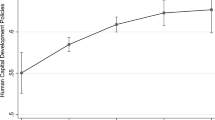Abstract
A study was conducted in order to examine the unique experiences of African-American, Hispanic, and Asian-American women in business careers. A multi-phase research design included: a survey of professional and managerial women of color in 30 companies with 1735 survey responses; an analysis of national census data; qualitative analyses from 59 focus groups and 83 individual interviews; and diversity policy analyses at 15 companies. The study found that retention of women of color was positively correlated with supportive behaviors of supervisors. The authors argue that the financial business case for diversity, e.g., the cost of turnover, is necessary but not sufficient for developing and sustaining supportive relationships between supervisors and their women of color direct reports.
Similar content being viewed by others
References
Barnum, P., R. C. Liden and N. DiTomaso: 1995, ‘Double Jeopardy for Women and Minorities: Pay Differences with Age’, Academy of Management Journal 38(3), 863–880.
Bell, E.: 1990, ‘The Bicultural Life Experiences of Career-oriented Black Women’, Journal of Organizational Behavior 11(6) (November), 459–477.
Bell, E. and S. Nkomo: 1994, Barriers to Work Place Advancement Experienced by African-Americans, Monograph for Glass Ceiling Commission (March).
Brutus, S.: 1999, 'Networking Patterns and Managerial Effectiveness: An Investigation of Racial Differences', paper presented at the 59th annual conference of the Academy ofb Management, Chicago, IL (August).
Canabou, Christine and A. Overholt: 2001, ‘Smart Steps’, Fast Company 44 (March), 91.
Catalyst: 1996, Women in Corporate Leadership: Progress and Prospects (New York, NY).
Catalyst: 2000, Women and the MBA: Gateway to Opportunity (New York, NY).
Chesler, M. and J. Moldenhauer-Salazar: 1998, ‘Diversity, Organizational Change and Social Justice: What's Happening in Conferences and Books?’, The Diversity Factor 6(3) (Spring), 13–19.
Cox, T. H.: 1994, Cultural Diversity in Organizations: Theory and Practice (Berrett-Koehler Publishers, San Francisco, CA).
Cox, T. H. and S. M. Nkomo: 1991, ‘A Race and Gender Group Analysis of the Early Career Experiences of MBAs’, Work and Occupations 18(4), 431–446.
Cox, T. H., S. Lobel and P. McLeod: 1991, ‘Effects of Ethnic Group Cultural Difference on Cooperative versus Competitive Behavior in a Group Task’, Academy of Management Journal 34, 827–847.
Davidson, M. N.: 1993, ‘The Effect of Racioethnicity on Beliefs about Coping with Interpersonal Conflict: A Comparison of African-American and European Americans. Amos Tuck School of Business', Dartmouth College, Working Paper no. 298:34.
Feagin, J. R. and M. Sikes: 1994, Living with Racism: The Black Middle-Class Experience (Beacon Press, Boston).
Ferdman, B. M. and A. C. Cortes: 1992, ‘Culture and Identity among Hispanic Managers in an Anglo Business', in S. B. Knouse, P. Rosenfeld and A. L. Culbertson (eds.), Hispanics and Work (Sage, Newbury Park, CA).
Fernandez, J. P.: 1981, Racism and Sexism in Corporate Life (Heath, Lexington, MA).
Fernandez, J. P.: 1991, Managing a Diverse Work Force: Regaining the Competitive Edge (Lexington Books, Lexington, MA).
Friedman, R. A. and D. Carter: 1993, ‘African-American Network Groups: Their Impact and Effectiveness', Harvard Business School, Working Paper No. 93–069.
Gattiker, U. E. and L. Larwood: 1988, ‘Predictors for Managers' Career Mobility, Success and Satisfaction’, Human Relations 41, 569–591.
Ibarra, H.: 1993, ‘Personal Networks of Women and Minorities in Management’, Academy of Management Review 18(1), 56–87.
Ibarra, H.: 1995, ‘Race, Opportunity, and Diversity of Social Circles in Managerial Networks’, Academy of Management Journal 38(3), 673–703.
Ilgen, D. R. and M. A. Youtz: 1986, ‘Factors Affecting the Evaluation and Development of Minorities in Organizations', in K. Rowland and G. Ferris (eds.), Research in Personnel and Human Resource Management: A Research Annual ( JAI Press, Greenwich, CT).
Judge, T. A. and R. D. Bretz: 1994, ‘Political Influence Behavior and Career Success’, Journal of Management 20, 43–65.
Landau, J.: 1995, ‘The Relationship of Race and Gender to Managers' Ratings of Promotion Potential’, Journal of Organizational Behavior 16, 391–400.
Marini, M. M.: 1989, ‘Sex Differences in Earnings in the United States', in W. R. Scott and J. Blake (eds.), Annual Review of Sociology, vol. 15 (Annual Reviews, Palo Alto, CA), pp. 343–380.
Mattis, M. C. and J. Cherry: 2000, Breaking the Barriers: Women in Senior Management in the U.K.(Catalyst, 56, New York, NY).
Nkomo, S. M.: 1992, ‘The Emperor has No Clothes: Rewriting "Race in Organizations"’, Academy of Management Review 17(3), 487–513.
Pettigrew, T. F. and J. Martin: 1987, ‘Shaping the Organizational Context for Black American Inclusion’, Journal of Social Forces 43, 71–78.
Society for Human Resource Management: 1998, SHRM Survey of Diversity Programs (New York, NY), August.
Stewart, L. P. and W. B. Gudykunst: 1982, ‘Differential Factors Influencing the Hierarchial Level and Number of Promotions of Males and Females within an Organization’, Academy of Management Journal 25, 586–597.
Thomas, D. A.: 1989, ‘Mentoring and Irrationality: The Role of Racial Taboos’, Human Resource Management 28(2), 279–290.
U.S. Department of Labor, Bureau of Labor Statistics: 1991, Bulletin 2385. Working Women: A Chartbook, August.
Woo, D.: 1985, ‘The Socio-economic Status of Asian-American Women in the Labor Force: An Alternative View’, Sociological Perspectives 28(3), 307–338.
Yamanaka, K. and K. McClelland: 1994, ‘Earning the Model Minority Image: Diverse Strategies of Economic Adaptation by Asian-American Women’, Ethnic and Racial Studies 17(1), 79–114.
Author information
Authors and Affiliations
Rights and permissions
About this article
Cite this article
Giscombe, K., Mattis, M.C. Leveling the Playing Field for Women of Color in Corporate Management: Is the Business Case Enough?. Journal of Business Ethics 37, 103–119 (2002). https://doi.org/10.1023/A:1014786313354
Issue Date:
DOI: https://doi.org/10.1023/A:1014786313354




